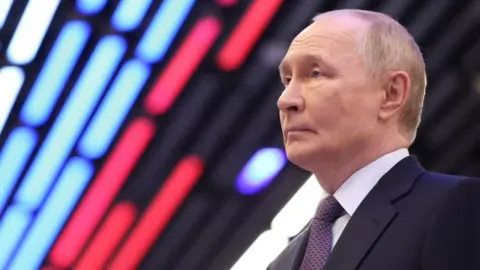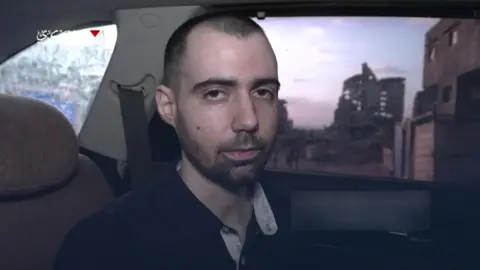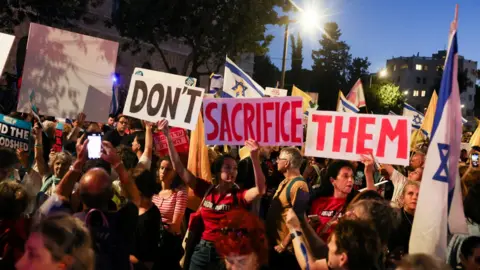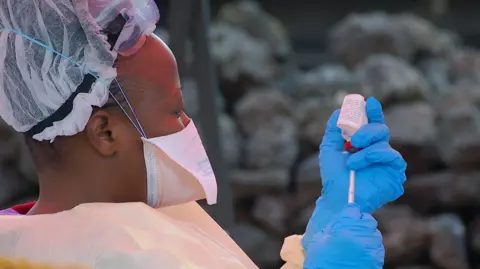Joseph Kabila, the former president of the Democratic Republic of Congo (DRC), has recently embarked upon a treason trial in a military court situated in the capital, Kinshasa. He finds himself facing a range of grave allegations, including murder, for allegedly supporting the M23 rebels, a group that has seized control over significant portions of the mineral-rich eastern region of the country. Kabila firmly denies these accusations and deliberately chose to abstain from the court proceedings.
The current president, Félix Tshisekedi, has placed the blame on Kabila, suggesting he orchestrated the M23 rebellion. In response to the trial, Kabila denounced the charges as "arbitrary" and accused the courts of being exploited as a "tool of oppression." Despite the emergence of a ceasefire agreement between the government and the rebels announced last week, violent clashes persist.
Kabila recently returned from self-imposed exile in South Africa, having spent two years living outside of the DRC. His return included a visit to the M23-controlled city of Goma in May. The United Nations and multiple Western nations allege that the M23 is receiving support from neighboring Rwanda, which has sent thousands of troops into the DRC, a claim that Rwanda refutes, asserting that its actions aim to prevent the conflict from escalating across its border.
In May, the DRC's upper legislative body rescinded Kabila's immunity as a senator for life, enabling his prosecution on charges encompassing treason, murder, insurrectionist activities, and the forced occupation of Goma. Kabila, who governed the DRC for 18 years after succeeding his assassinated father Laurent in 2001 at the age of 29, transferred power to Tshisekedi in 2019 after a disputed election, but the relationship soured over time.
In a now-deleted YouTube video from May, Kabila criticized the current Congolese government, labeling it a "dictatorship" and characterizing the situation as one reflecting a "decline of democracy" within the nation. Congolese government spokesperson Patrick Muyaya swiftly dismissed Kabila's claims, stating he had "nothing to offer the country."
As the trial approaches, Ferdinand Kambere, a close associate of Kabila and former member of his now-dissolved political party PPRD, accused the government of showing "double standards." He contended that while the government appeared lenient in its dealings with the rebels, it was unnecessarily harsh toward Kabila, suggesting that the trial was orchestrated to eliminate Kabila from the political sphere of the DRC.
The current president, Félix Tshisekedi, has placed the blame on Kabila, suggesting he orchestrated the M23 rebellion. In response to the trial, Kabila denounced the charges as "arbitrary" and accused the courts of being exploited as a "tool of oppression." Despite the emergence of a ceasefire agreement between the government and the rebels announced last week, violent clashes persist.
Kabila recently returned from self-imposed exile in South Africa, having spent two years living outside of the DRC. His return included a visit to the M23-controlled city of Goma in May. The United Nations and multiple Western nations allege that the M23 is receiving support from neighboring Rwanda, which has sent thousands of troops into the DRC, a claim that Rwanda refutes, asserting that its actions aim to prevent the conflict from escalating across its border.
In May, the DRC's upper legislative body rescinded Kabila's immunity as a senator for life, enabling his prosecution on charges encompassing treason, murder, insurrectionist activities, and the forced occupation of Goma. Kabila, who governed the DRC for 18 years after succeeding his assassinated father Laurent in 2001 at the age of 29, transferred power to Tshisekedi in 2019 after a disputed election, but the relationship soured over time.
In a now-deleted YouTube video from May, Kabila criticized the current Congolese government, labeling it a "dictatorship" and characterizing the situation as one reflecting a "decline of democracy" within the nation. Congolese government spokesperson Patrick Muyaya swiftly dismissed Kabila's claims, stating he had "nothing to offer the country."
As the trial approaches, Ferdinand Kambere, a close associate of Kabila and former member of his now-dissolved political party PPRD, accused the government of showing "double standards." He contended that while the government appeared lenient in its dealings with the rebels, it was unnecessarily harsh toward Kabila, suggesting that the trial was orchestrated to eliminate Kabila from the political sphere of the DRC.




















